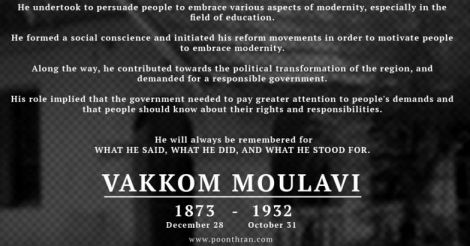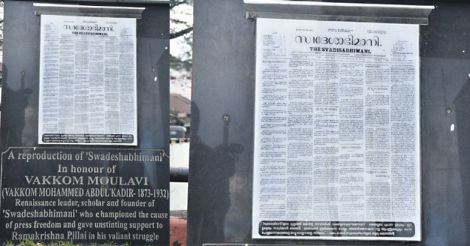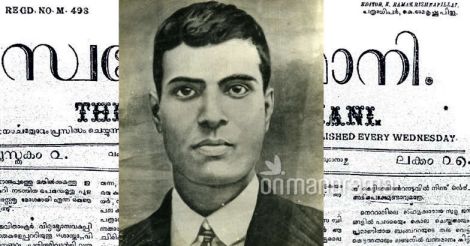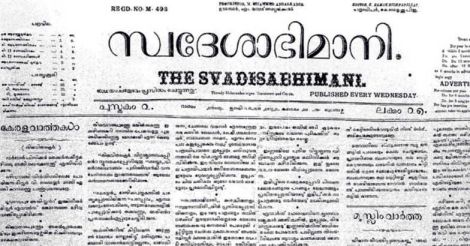It has been 84 years this Oct. 31 since Vakkom Mohammed Abdul Khadir Moulavi, popularly known as Vakkom Moulavi, died in the erstwhile princely state of Travancore but the man who blazed the trail of political journalism in Kerala, if not in India, is yet to be given credit for his use of journalism for socio-religious reformation.
Time and again, one listens to the wonderful speech by Nigerian writer Chimamanda Ngozi Adichie on the ‘dangers of a single story’.
In her now famous speech, Adichie puts it in her eloquent narrative:
It is impossible to talk about the single story without talking about power. There is a word, an Igbo word, that I think about whenever I think about the power structures of the world, and it is “nkali”. It's a noun that loosely translates to "to be greater than another." Like our economic and political worlds, stories too are defined by the principle of nkali. How they are told, who tells them, when they're told, how many stories are told, are really dependent on power.
Power is the ability not just to tell the story of another person, but to make it the definitive story of that person. The Palestinian poet Mourid Barghouti writes that if you want to dispossess a people, the simplest way to do it is to tell their story and to start with, "secondly." Start the story with the arrows of the Native Americans, and not with the arrival of the British, and you have an entirely different story. Start the story with the failure of the African state, and not with the colonial creation of the African state, and you have an entirely different story.
Vakkom Abdul Khadir Moulavi (1873-1932) was a man of many stories. But eight decades after his death, he is more remembered as a religious reformer who led Islamic renaissance in Kerala than as a fearless journalist who had strong convictions of nationalism and a visionary understanding of the power of journalism.
The Muslim orthodoxy in Kerala had always been against Vakkom Moulavi’s modernist views, and no wonder that the same elements, in their new avatars, often poke at him even today. M.A. Shakoor, who was senior assistant editor of Dawn and later London correspondent of Pakistan Times, and one of Vakkom Moulavi’s nephews, once wrote: “Maulavi Abdul Qadir did not accept the puritanical excesses, petty intolerance and the violent methods of enforcement often associated with Mohammad ibn Abdul Wahhab and his movement.”
On the other hand, Vakkom Moulavi believed in a secular society and worked hard to reform the Muslim community in Kerala because he knew unless the minority communities were reformed and developed, India as a country could not make any real progress.
At a time and in an India where religious intolerance and jingoism have taken to violent and weird methods of expression where a moulavi should by all means be ‘an enemy within’ and a ‘patriot Muslim’ is an oxymoron, Vakkom Moulavi’s story should be told in a different light, without, of course, the principle of nkali.
 A slide on Vakkom Moulavi. Courtesy: poonthran.com
A slide on Vakkom Moulavi. Courtesy: poonthran.comIn many ways, Vakkom Moulavi was a man who lived ahead of his time. Born into a wealthy family in the erstwhile princely state of Travancore and trained in languages and subjects by hand-picked scholars, Abdul Khadir had a sharp mind. His wide reading and quest for knowledge helped him shape a national outlook and realize the importance of education for social development. While he never traveled outside India, either for education or for business, he shaped his sociopolitical and religious outlook through the knowledge he gained through his reading and research.
By the age of 30, Vakkom Moulavi had a patriotic heart beating fervently within him. Influenced by the ideals of Rashid Rida and his writings in the Egyptian publication Al Manar, Vakkom Moulavi believed in the critical role of media in social reformation and in achieving and protecting civil rights and liberty. He questioned the ‘divinity’ of the royal and stood up for the rights of the people as citizens and not as mere ‘subjects’ of a king.
While he was inspired by what he read in Al Manar and other publications, he was not content to remain inactive and puffed up with knowledge but he turned his attention to his own society and tried to put into practice what he believed in by launching first Swadeshabhimani (The Patriot) and then Muslim—both with clarity of vision and well-defined mission.
Swadeshabhimani, The Patriot (1905-1910)
When he started Swadeshabhimani, as a weekly newspaper, in 1905, it was to empower the citizens of Travancore, to make them aware of their rights to freedom and liberty, and to remind the royal rulers and the Dewans appointed by the British that the people of the land were not ‘subjects’ of exploitation and nepotism. He was indeed championing the democratic rights of his countrymen at a time when civil rights movements had not gained any momentum across India.
Vakkom Moulavi’s decision to start Swadeshabhimani was not an epiphanic one but one taken after careful deliberation and thought. He knew what he wanted and what he was getting into. The fact that he had imported the latest automatic flatbed printing press available in the market then direct from England, spending his bequeathed wealth through the nose, and that Swadeshabhimani was the first newspaper in Kerala to subscribe to Reuters news agency shows that Vakkom Moulavi was abreast of the latest trends in the industry. He had not only named both the printing press and the newspaper ‘Swadeshabhimani’ but also started a library in his village by the same name. So, the leitmotif of his activities was patriotism, not business interests. And, patriotism in its all-inclusive, progressive and positive sense.
He knew it well that publishing a newspaper was not a lucrative business and when some of his relatives tried to dissuade him from launching Swadeshabhimani, Vakkom Moulavi said:
“I am not a businessman. What I want to achieve with the newspaper is social service and patriotism. Money is not the ultimate profit I need. I firmly believe that my country will get what I am looking for. That is enough for me.”
Vakkom Moulavi was not any frog-in-the-well religious leader who had lost reason and compassion by an overdose of communal frenzy or religious obscurantism. It is evident from his own words that he did not jump into launching Swadeshabhimani by any whim or fancy but he surely knew what he was going in for, and was ready for any financial loss for a noble cause. He had used two operative words in laying down his purpose: ‘social service’ and ‘patriotism’. And, he hoped his ‘country’, not his religion, would benefit from his efforts.
Yes, Vakkom Moulavi had his religious convictions and a deep understanding of Islam and had worked tirelessly for the uplift of his own community but we should not forget that he had worked up a fine balance between his commitment to his community and to the society and the country.
In the editorial of the first edition of Swadeshabhimani on January 19, 1905, its editor C.P. Govinda Pillai wrote:
“We don't declare that Swadeshabhimani will perform great things for the Muslim community and other communities, who desire their well-being. Our primary objective is that Swadeshabhimani's work should promote public welfare and prosperity. To achieve this objective, we will do our utmost. We will not conceal any public grievances fearing dangers that may happen to us.”
Vakkom Moulavi knew it well that it would not be a bed of roses for him or for his paper when he had decided to use journalism for public welfare and prosperity. One of the mission statements of Swadeshabhimani was that the paper would not ‘conceal any public grievances fearing danger that may happen to us’.
 Vakkom Moulavi memorial at Palayam in Thiruvananthapuram. Photo: Special arrangement
Vakkom Moulavi memorial at Palayam in Thiruvananthapuram. Photo: Special arrangementDr Jose Abraham, author of 'Islamic Reform and Colonial Discourse on Modernity in India: Socio-Political and Religious Thought of Vakkom Moulavi', writes: “When people's rights and privileges were not respected by state bureaucrats, no one dared to raise voice against it and bring it to the attention of the Maharaja. Moreover, no journals in Travancore were ready to carry out this challenging responsibility. This was the gap that Swadesabhimani promised to fill. Through editorials and columns, people's rights — where these were challenged or denied — were highlighted even by risking everything and always living up to its ideals. Therefore, taking into consideration the political and social structures of Travancore at the beginning of the twentieth century, Swadeshabhimani was the medium to express public grievances to the government, and indeed to challenge its responsibility.”
“Fear, crookedness and greed will not build a country” — Vakkom Moulavi printed the line under the masthead of Swadeshabhimani, and practiced such a brand of journalism that no one had till then dared to do in India, let alone Travancore. Influential nationalist newspapers like Leader (1909) from Allahabad and Bombay Chronicle (1910) from Bombay were published only after Swadeshabhimani was suppressed, the press confiscated and its editor Ramakrishna Pillai was sent into exile through royal decree.
When Vakkom Moulavi teamed up with Ramakrishna Pillai, who was the second editor of Swadeshabhimani, both brave, passionate, honest and committed to their causes and profession, it was the beginning of an unparalleled professional association. The way and to the extent Vakkom Moulavi gave Ramakrishna Pillai professional freedom was unheard of in the history of journalism even today.
 Ramakrishna Pillai. Onmanorama/File
Ramakrishna Pillai. Onmanorama/FileThanks to his fearless journalism through Swadeshabhimani and his eventual exile, Ramakrishna Pillai had risen to legendary stature in the history of journalism in Kerala. However, the story of Vakkom Moulavi does not start or end with Ramakrishna Pillai. Both men were journalists in their own merits, and both men had their own separate stories.
To make Swadeshabhimani a spearhead in political journalism, Vakkom Moulavi did not have to depend on anyone else. He himself was good enough to edit and lead publications with strong socio-religious messages as it was evident in the cases of Muslim, Deepika and Al Islam.
Shakoor writes: “The dual task of running ‘The Patriot’ (Swadeshabhimani) and leading the Muslim reformist movement at the same time soon proved unmanageable and Maulavi Abdul Qadir looked for an editor for ‘The Patriot’ who would measure up to the high standard o£ integrity, courage and political principles he had set for his journal. He was lucky to have found such a man in a young graduate called Ramakrishna Pillai who had just then been sacked by his own uncle from the editorship of his weekly journal because of his views and uncompromising adherence to principles. A personal interview and discussion of matters of principle convinced Maulavi Abdul Qadir that he had found just the man he wanted. Ramakrishna Pillai was equally lucky to have found just the right man to work with. Maulavi Abdul Qadir placed implicit faith in Ramakrishna Pillai’s integrity, patriotism, and political ideals, which were identical to his own. Not once throughout the stormy life of the journal did Maulavi Abdul Qadir find the need to interfere in the editorial policy of his journal to keep it on course he had charted for it. This political collaboration which began in 1906 between two young radical democrats forms a glorious chapter in the political history of Kerala.”
Be it the quirkiness of history or the narratives that recreate history, Vakkom Moulavi’s journalistic contributions — both before and after his association with Ramakrishna Pillai — have not been given the credit they deserve.
It is highly unfair to see Vakkom Moulavi being pushed into the grey stillness of selective amnesia while Ramakrishna Pillai’s name has been prefixed with Swadeshabhimani.
When the king of Travancore, on the recommendations of the Dewan, suppressed Swadeshabhimani, confiscated the press and sent the editor into exile, Vakkom Moulavi refused to apologize for what he stood for and reportedly said that he did not want the press without the editor! Though it incurred huge financial loss to him, the setback did not deter his journalistic activities. He went on to publish Deepika and Al Islam in his efforts to ‘clean up’ the Muslim community which was steeped in superstitions, and to argue his case for the need to educate Muslim women.
In his own right and by the merit of his sharp and incisive writing, Vakkom Moulavi was a shining example of a journalist and a media entrepreneur, whose knees did not jerk nor did his spine bend in servitude to the powers-that-be but had the cold-blooded courage to fight rampant bureaucratic corruption, and to stand up for the democratic rights of the people. Moreover, he did not fire from anyone else’s shoulder but his own, and spent almost all his wealth for the sake of his society and community.
At a time when a section of Indian media has taken ‘patriotism’ to the levels of jingoism and convoluted the sense of national security to the quixotic scenario of creating enemies to fight battles to ‘save the nation’, Vakkom Moulavi’s sense of patriotism and his unselfish journalistic efforts to propagate nationalism and the people’s right to freedom and liberty a century ago should not be brushed under the carpet at any pretext. Nor should his clear-eyed understanding of the role and place of cultural and community identities in the unique sociopolitical mosaic of India.
As Adichie rightly says, power is the ability not just to tell the story of another person, but to make it the definitive story of that person. It will be a gross injustice to Vakkom Moulavi and his visionary journalistic attempts if we do not tell his story in right earnest — that he was not just a generous newspaper owner but was himself a fearless journalist, well-read and with felicity of language and moral honesty and intent to spend even his last penny for its cause.
When he died at the relatively young age of 58, he was in debt, having spent all his money for the society and community.
The story of Vakkom Moulavi is not, and should not, be an appendix to anyone else’s story.
(Sabin Iqbal, a journalist based in Thiruvananthapuram, is the grandson of Vakkom Abdul Khadir Moulavi.)

























 Swadeshabhimani newspaper that was published by Vakkom Moulavi. Photo: Special arrangement
Swadeshabhimani newspaper that was published by Vakkom Moulavi. Photo: Special arrangement